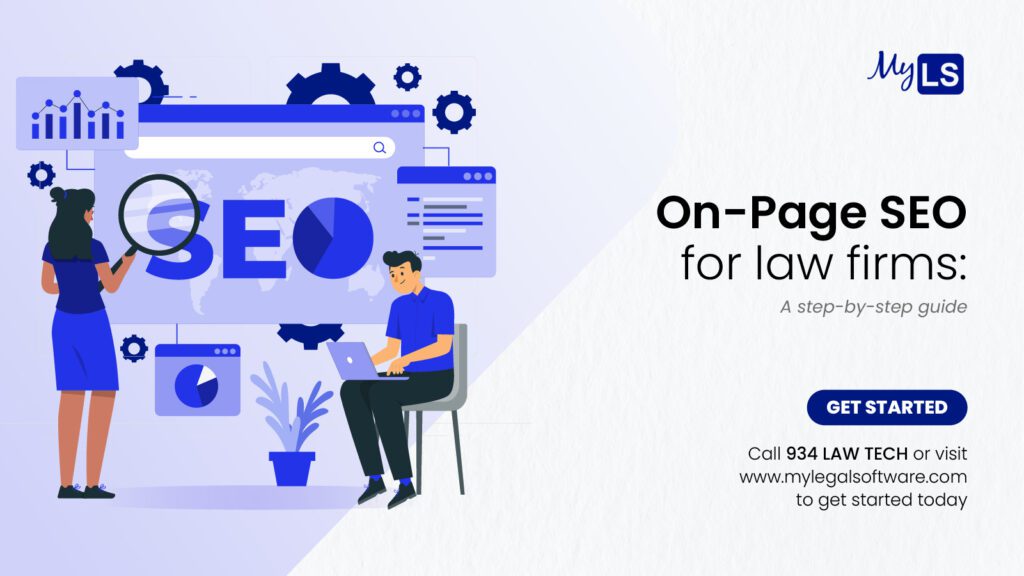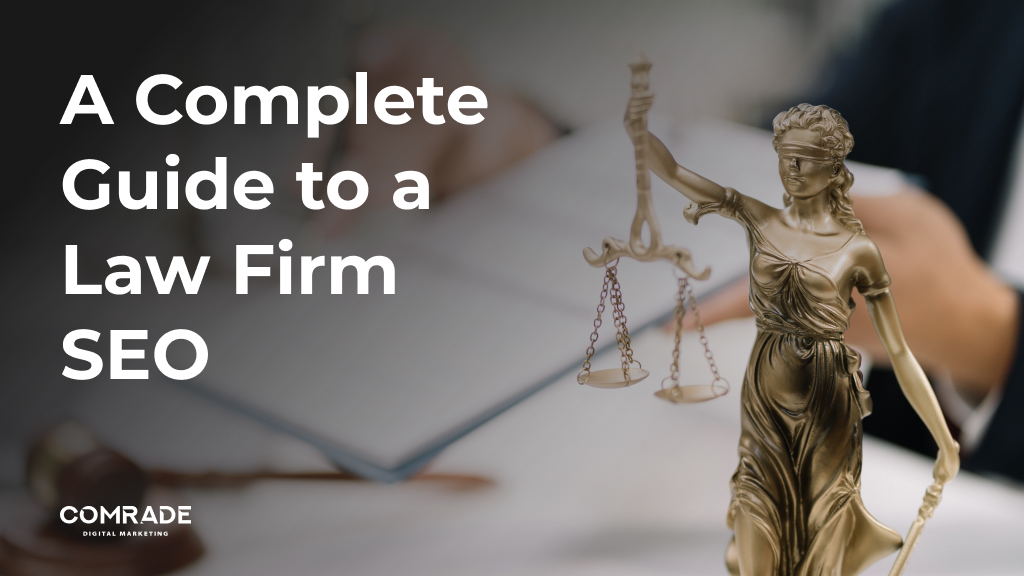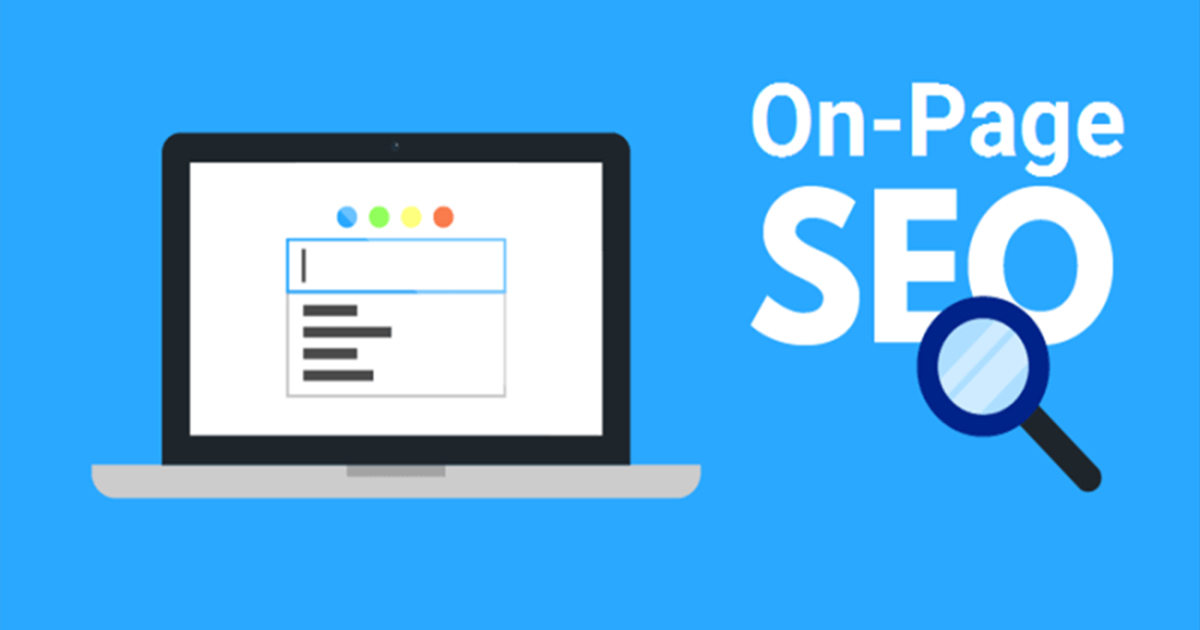Unlock the secrets to dominating search engine results with our comprehensive guide to mastering on-page SEO for law firms.

Image courtesy of via DALL-E 3
Table of Contents
In today’s digital age, having a strong online presence is essential for businesses to thrive. Law firms, like any other business, can benefit greatly from utilizing Search Engine Optimization (SEO) strategies to improve their visibility on the internet. One crucial aspect of SEO that law firms need to master is on-page SEO, which involves optimizing individual web pages to rank higher in search engine results. In this comprehensive guide, we will delve into everything you need to know about mastering on-page SEO for law firms.
What is On-Page SEO?
On-page SEO is the process of optimizing the content and HTML source code of a web page to make it more search engine-friendly. This includes incorporating relevant keywords, improving meta tags, and enhancing the overall user experience. By focusing on on-page SEO, law firms can attract more organic traffic to their website and ultimately attract potential clients.
Why Law Firms Need SEO
With the majority of people turning to search engines like Google to find legal services, it’s crucial for law firms to have a strong online presence. SEO plays a vital role in helping law firms rank higher in search results, making it easier for potential clients to discover their services. By implementing effective SEO strategies, law firms can stand out in a competitive online landscape and connect with those in need of legal assistance.
Understand Your Keywords
Keywords are the cornerstone of effective SEO for law firms. They are the words or phrases that potential clients type into search engines when looking for legal services. Understanding how to choose the right keywords is crucial for boosting your online visibility and attracting the right audience.
What are Keywords?
Keywords are like clues that tell search engines what your website is about. When someone searches for “best family lawyer near me” or “personal injury attorney in my city,” these are the keywords they are using to find relevant information. By incorporating the right keywords into your website content, you increase the chances of appearing in search results for these queries.
Finding the Right Keywords
To find the most effective keywords for your law firm, you can use tools like keyword planners. These tools help you discover popular search terms related to legal services that potential clients are using. By identifying and targeting these keywords in your website content, you can improve your chances of ranking higher in search engine results and attracting qualified leads.
Crafting Compelling Titles and Headings
When it comes to optimizing your law firm’s website for search engines, crafting compelling titles and headings is a crucial aspect of on-page SEO. These titles and headings not only attract attention but also play a significant role in improving your search rankings. In this section, we will provide you with tips on creating engaging and SEO-friendly titles and headings to enhance your online presence.
Importance of Good Titles
Titles are the first thing that visitors see when they come across your website on search engine results pages. A well-crafted title can greatly impact click-through rates and ultimately, your SEO performance. It’s essential to create titles that accurately represent the content of your page while including relevant keywords. This helps search engines understand the context of your page and increases its visibility to potential clients seeking legal services.
Creating Effective Headings
Headings are like signposts that guide readers through your content. By incorporating keywords into your headings, you can make it easier for both visitors and search engines to understand the main topics discussed on a page. When crafting headings, remember to keep them concise and descriptive. Use H1 tags for the main title, followed by H2 and H3 tags for subheadings. This not only makes your content more scannable for readers but also signals the importance of different sections to search engines.
By following these simple rules and examples, you can create titles and headings that not only improve your SEO performance but also enhance the overall user experience on your law firm’s website.
Optimizing Content for SEO
When it comes to optimizing content for SEO, quality is key. The content you create for your law firm’s website should be clear, helpful, and interesting to your readers. Think about the common questions and concerns your potential clients may have, and address them in your content. By providing valuable information, you not only engage your audience but also improve your chances of ranking higher in search engine results.

Image courtesy of via Google Images
Using Keywords Naturally
Integrating keywords into your content is essential for SEO, but it’s equally important to do so in a way that feels natural. Instead of stuffing your content with keywords, aim to include them in a way that flows smoothly and enhances the overall readability of your text. By seamlessly incorporating keywords into your content, you can signal to search engines the relevance of your pages without sacrificing the user experience.
Optimizing Images and Media
When it comes to optimizing your law firm’s website for search engines, don’t overlook the importance of images and other media. By taking a few simple steps, you can not only enhance your site’s user experience but also improve your SEO visibility. Let’s delve into how you can optimize images and media effectively.
Using Alt Text
Alt text, or alternative text, is a brief description of an image that appears when the image fails to load on a webpage. This text serves as a crucial element for accessibility and SEO. When adding alt text to your images, make sure to include relevant keywords that describe the image accurately.
Optimizing File Names
When saving images and media files for your website, remember to use descriptive file names. Instead of generic names like “image1.jpg,” opt for names that reflect the content of the file. For instance, if you’re uploading a picture of your law firm’s office, a suitable file name could be “law-firm-office.jpg.” This practice not only helps search engines understand the content of your media but also contributes to your overall SEO strategy.
Improving Page Load Speed
In the world of websites, speed matters a lot! When you click on a link, you want the page to load quickly so you can read the information you’re looking for, right? That’s why it’s essential for websites to load fast, not just for you, but also for search engines like Google. Let’s explore why page load speed is crucial for SEO and how you can make your website faster.

Image courtesy of via Google Images
Why Speed Matters
Imagine you’re trying to find a yummy recipe online, and the page takes forever to load. Frustrating, isn’t it? Slow-loading pages can make visitors give up and leave your site, which isn’t good for keeping people interested in what you have to say. Search engines like Google also take page load speed into account when deciding which websites to show at the top of search results. So, having a speedy website not only keeps visitors happy but also helps your site rank higher in search engines.
Tips to Increase Speed
Now, you might be wondering, “How can I make my website faster?” Don’t worry; here are some simple tricks to speed up your site:
First, try compressing your images. Images that are too big can slow down your page, so make sure to resize them before you upload them to your website. This way, your images will still look great, but they won’t slow things down.
Next, consider using efficient web hosting. Think of web hosting like the home where your website lives. Choosing a good web host can make a big difference in how fast your pages load. Look for a hosting provider that offers fast servers and reliable service to keep your website running smoothly.
By following these tips and keeping your website speedy, you’ll not only make visitors happy but also boost your SEO performance. So, make sure your pages load fast to keep everyone clicking and reading!
Building Internal Links
Internal links are like pathways on a website that connect different pages together. They help visitors navigate through the site and also assist search engines in understanding the structure and hierarchy of the content. Think of them as digital signposts that guide you from one room to another in a big building.
How to Use Internal Links
When using internal links, it’s essential to make them relevant and helpful. Choose anchor text, which is the clickable words in a hyperlink, that accurately describes the page you are linking to. For example, if you’re writing a blog post about personal injury cases, you can have an internal link to your page that explains the services your law firm offers in that area.
Ensuring Mobile Friendliness
Nowadays, more and more people are using their smartphones and tablets to browse the internet. This shift in behavior has a significant impact on how search engines rank websites. If your law firm’s website is not optimized for mobile devices, you could be missing out on potential clients. Search engines prioritize mobile-friendly websites because they provide a better user experience for mobile users, leading to higher rankings in search results. So, ensuring that your website is mobile-friendly is key to attracting and retaining clients online.

Image courtesy of via Google Images
Creating a Responsive Design
One effective way to make sure your website is mobile-friendly is by implementing a responsive design. A responsive design automatically adjusts the layout and content of your website to fit the screen size of the device being used, whether it’s a smartphone, tablet, or desktop computer. This ensures that your website looks great and functions well on any device, providing a seamless and user-friendly experience for visitors.
Conclusion
In conclusion, mastering on-page SEO for law firms is essential for boosting their online presence and attracting potential clients. By following the tips and strategies outlined in this guide, law firms can improve their search engine rankings and increase website traffic.
SEO in a Nutshell
To summarize, on-page SEO involves optimizing individual web pages with the right keywords, titles, headings, and content. It also includes optimizing images, improving page load speed, building internal links, and ensuring mobile friendliness. These steps work together to enhance a law firm’s online visibility and reach.
Next Steps
We encourage law firms to start implementing these on-page SEO tips and techniques on their websites. By regularly tracking their progress and making adjustments as needed, they can continue to improve their SEO performance and attract more clients online.
Want to turn these SEO insights into real results? Seorocket is an all-in-one AI SEO solution that uses the power of AI to analyze your competition and craft high-ranking content.
Seorocket offers a suite of powerful tools, including a Keyword Researcher to find the most profitable keywords, an AI Writer to generate unique and Google-friendly content, and an Automatic Publisher to schedule and publish your content directly to your website. Plus, you’ll get real-time performance tracking so you can see exactly what’s working and make adjustments as needed.
Stop just reading about SEO – take action with Seorocket and skyrocket your search rankings today. Sign up for a free trial and see the difference Seorocket can make for your website!
Frequently Asked Questions (FAQs)
How Long Does it Take to See Results?
After implementing on-page SEO strategies for your law firm’s website, you may wonder how long it will take to see improvements in search engine rankings. It’s important to understand that SEO is a gradual process and results may not be immediate. In most cases, it can take a few months before you start noticing significant changes in your website’s visibility on search engines. Consistent and quality optimization efforts over time will help establish your website’s credibility and improve your online presence.
Do I Need to Hire an Expert?
While mastering on-page SEO for your law firm can be a complex task, hiring an SEO expert is not always necessary. If you have the time and resources to dedicate to learning and implementing SEO techniques, you can effectively improve your website’s optimization on your own. There are plenty of online resources, guides, and tools available to help you navigate the world of SEO. However, if you find the process overwhelming or prefer to focus on other aspects of your law firm, hiring an SEO expert can be beneficial. An experienced professional can offer valuable insights, save you time, and help you achieve your SEO goals more efficiently.







